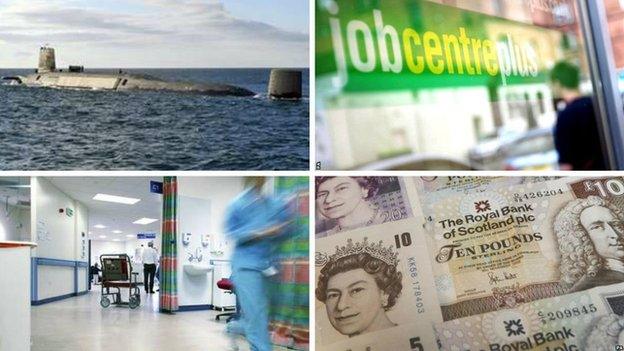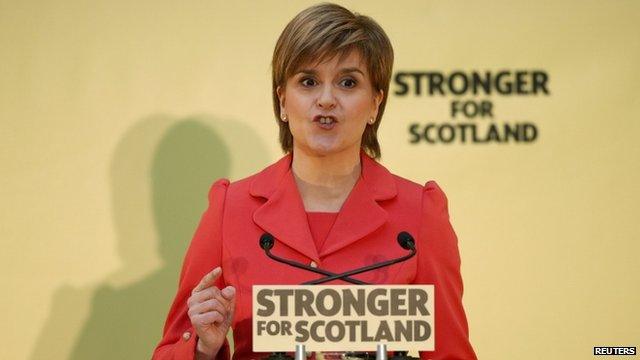Election 2015: What is the SNP's plan for Scotland in the UK?
- Published

The SNP pledged a spending increase to boost investment in jobs and public services, as well as renewing their commitment to vote against Trident
The Scottish National Party "will always support independence" says its leader Nicola Sturgeon - but after the proposition was rejected in last year's referendum, she has set her sights on a staging post.
The immediate constitutional goal is now for Scotland to gain control of all taxation, including North Sea revenues, loosening the ties that bind the United Kingdom together.
The SNP manifesto ditches the dismal name for this policy of "full fiscal autonomy" in favour of "full fiscal responsibility" and "full financial responsibility."
Better? You can decide.
Whatever it is called, the precise meaning is disputed but it is usually taken to describe Scotland having control of all taxation raised north of the border, including revenue from oil in its territorial waters.

Nicola Sturgeon said the SNP at Westminster would work towards interests in the whole of the UK
The country would remain in the United Kingdom in something akin to a federal arrangement, paying the Treasury in London for shared services, such as defence and foreign affairs.
There are some big problems with FFA just now, and they are set out in the arid tables, charts and graphs of Government Expenditure and Revenue Scotland 2013/14, external.
According to GERS, Scotland was £12.4bn in the red in 2013/14, raising £10,100 per person but spending £12,500 each.
Of course the UK is also in the red but Scotland's situation is comparatively worse.
Measured relative to the size of the economy, Scotland had a significantly greater deficit than the UK average in 2013/14 at 8.1% of GDP compared to 5.6% for the UK as a whole.
Most economists think this is a long way from sustainable.
And critics argue that it is not even unusual in recent times. Including oil revenue, Scotland spent more and raised less than the UK average, external in 12 of the past 15 financial years, they say.
And with oil production on the wane and a slump in the price this situation has been worsening.
The SNP say a "fully fiscally responsible" Scotland could do better. It could tailor economic policy to the country's needs, balance the books and perhaps eventually put the profits from oil aside in the good years to help the country through tougher times.
Supporters have set out the case that the country would be much better off independent, external.
'Several years'
Whether or not that long term vision is realistic, for now it looks tricky. On the latest available figures, the Institute for Fiscal Studies (IFS) estimates that it would leave Scotland with a £7.6bn shortfall - on top of the country's current share of the UK deficit.
This prediction has been seized on by the SNP's opponents who have accused the nationalists of refusing to accept defeat in last year's independence referendum and being hell-bent on bankrupting the country by other means.
The SNP leader Nicola Sturgeon understands these difficulties.
During a televised debate earlier this month she confirmed her MPs would vote for full fiscal autonomy if they could next year but she has since deployed phrases like "in years ahead" and "in several years" when asked when it might happen.
And today, the manifesto has little to say on the detail and the timetable, other than the "transition to full fiscal responsibility - and agreement of the detailed fiscal framework that would underpin it - would take a number of years."
The SNP does not want this debate to become the central theme of this general election campaign.
Their opponents have precisely the opposite intention.